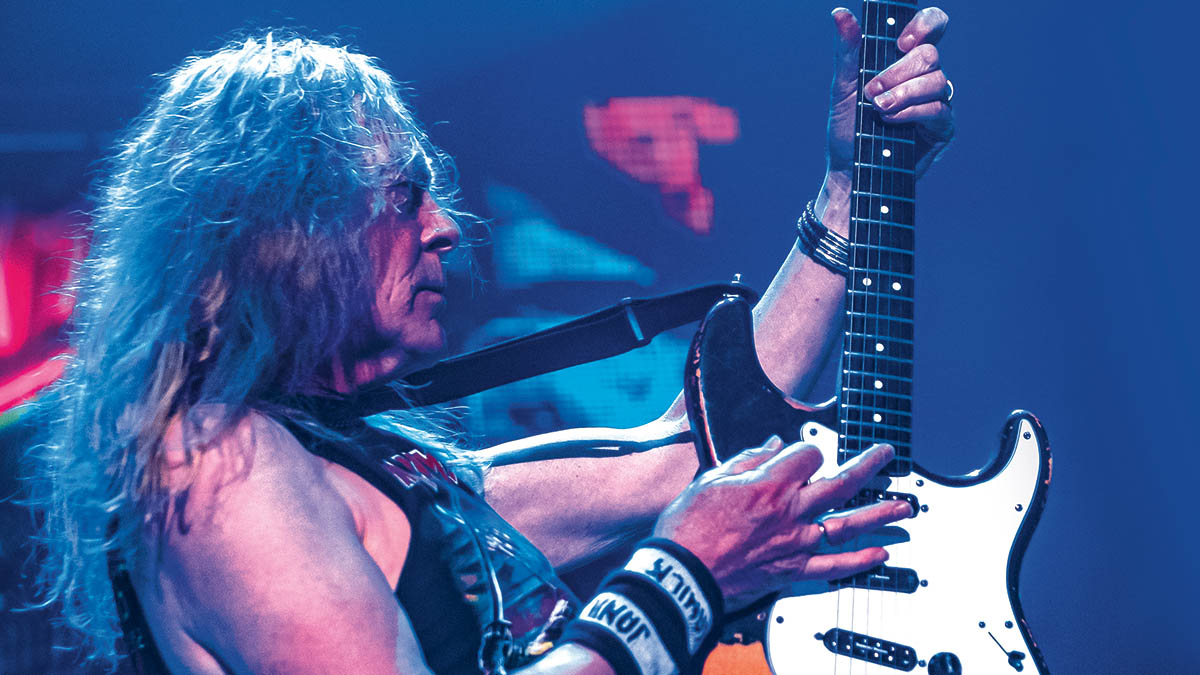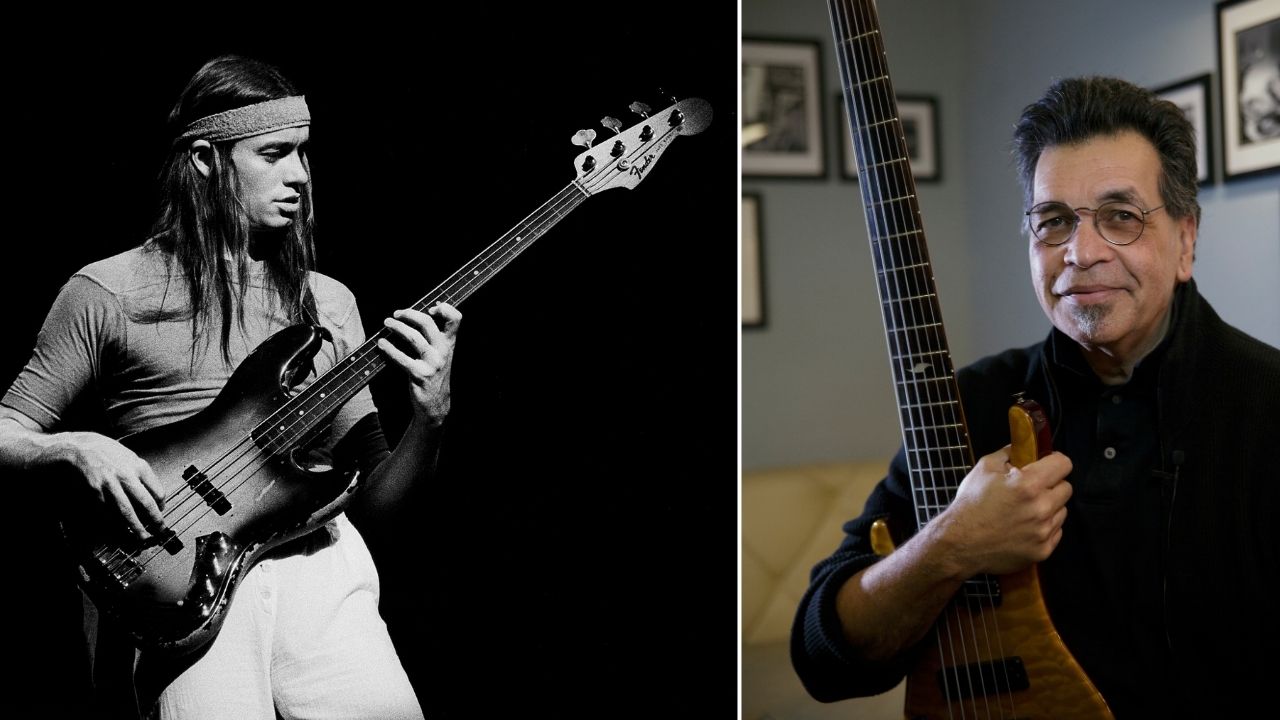“What people tend to do is learn licks and then try to stick them into the solos – and that’s not really the way to do it”: Iron Maiden’s Janick Gers shares his tips for better guitar solos
The Iron Maiden stalwart explains why he is a big advocate for guitar solos with the safety off: no soundchecks, no warm-ups, and something different each and every night

There is a school of thought that to play better solos you need to know what you’re playing, you need to warm yourself up, you need to be ready. Preparation is everything. But Janick Gers, one of the prongs on Iron Maiden’s electric guitar trident says forget all that – and he has been doing this a long time.
Checking in with Total Guitar, he argues that you need some kind of danger in the enterprise lest you go stale, and also that we have to think about solos as art, not sport. There is no better, no best, he says. But you’re going to get more out the more imagination you put in.
You have to experiment
“You can use a lot of different tunings. I keep a lot of guitars around the house in different tunings. That way, when you pick one up different things come out. You have to experiment and see what interests you. Once you know, you have to carry on and try to push your boundaries.
“Practice is important but use your mind and think. Everyone has a different way of playing. There are a lot of guitar schools where you learn the same chords and scales, which ultimately means people ending up sounding the same.
“You have to be innovative and remember that nobody does it right. There is no right. There is no best. Everything is what you make it. Try to find the best way to get what’s in your mind into your fingers and onto your guitars. That’s how you find melodies. Put your personality onto your guitar…”
Think about what you actually want to do with a solo
“You need to practice your alternate picking and scales, but you have to remember a lot of those things you can’t actually put into songs. You need to have the ability to do more than that. What people tend to do is learn licks and then try to stick them into the solos, and that’s not really the way to do it.
“You should think about what you actually want to do with each solo. But what I say is not right, you’ve got to make your own mind up. Nobody is wrong. A Rolls Royce is the same as a Mini. If you’re excited enough you can get moving. Everything is equal.
All the latest guitar news, interviews, lessons, reviews, deals and more, direct to your inbox!
“A Led Zeppelin album costs as much as the guy playing the pub round the corner. It’s down to you to find what you believe in, how you practise and what you hope to achieve. Practice is important, because you have to be able to play whatever you are thinking. You need to know how to put it onto the guitar.”
Warming up is overrated
“I find that before a gig, I very rarely touch the guitar. I want to see what happens when I get out there. I don’t like to warm up; the first time I’ll pick up my guitar is when I’m about to walk on stage. I find that exciting because I don’t know what’s going to happen!
“I’m not backstage with a metronome, thinking I’m not ‘on’ tonight or anything like that. I’ll check the tuning and then I’m out there, feeling that buzz every night. It’s always a shock. We don’t soundcheck, because when the halls are empty, the echoes are ridiculous.
A lot of bands soundcheck for five hours and then come on stage thinking, ‘Oh, now it sounds sh*t!’ And of course it does, because they’ve set it up for the echo
“We’re playing these huge arenas and you can barely hear what’s going on, the sound goes round and round. So our stage crew do a line check in the afternoon. The sound is set before the audience are in, but as you know, once people are in the arena, the echoes disappear.
“A lot of bands soundcheck for five hours and then come on stage thinking, ‘Oh, now it sounds shit!’ And of course it does, because they’ve set it up for the echo, but really you need to do it for when the people are in.
“So going out there and not knowing what the audience will be like and how the gig is going to go, I find that exciting. It’s like jumping into a freezing cold pond and wondering what will happen next. It hits you in the face. The excitement is refreshing!”
Keep solos spontaneous
“Spontaneity is important. For me personally, if that disappears, it becomes a cabaret act. So I like to change the solos slightly, not to the point where people get pissed off, but utilise different areas within the solo.
“Every night I try to make it a little bit different, but still keeping the main melodies. The one thing that would kill me is doing the same thing every night. It can’t be like that with me. Even my chord inversions change, I’m looking for better ways all the time. I never wanted to be in a cabaret band. I’ve seen that happen to people and it becomes mundane.
The one thing that would kill me is doing the same thing every night. It can’t be like that with me. Even my chord inversions change
“I never work out my solos. I purposely try to and do something different every time – if I cut a solo on a track three times before choosing, each one will be different. Looking for something different every time keeps you on edge – you feel the rage and the excitement.
“If I knew exactly what I’d play every night, after 10 gigs on a nine-month tour… Some people do that and that’s fine; people like Steve Howe will play exactly the same lines – and he’s incredible – but that’s not for me. I need more excitement, otherwise it becomes cabaret… I can’t be having that!”
- Senjutsu is out now via Sanctuary.
Amit has been writing for titles like Total Guitar, MusicRadar and Guitar World for over a decade and counts Richie Kotzen, Guthrie Govan and Jeff Beck among his primary influences as a guitar player. He's worked for magazines like Kerrang!, Metal Hammer, Classic Rock, Prog, Record Collector, Planet Rock, Rhythm and Bass Player, as well as newspapers like Metro and The Independent, interviewing everyone from Ozzy Osbourne and Lemmy to Slash and Jimmy Page, and once even traded solos with a member of Slayer on a track released internationally. As a session guitarist, he's played alongside members of Judas Priest and Uriah Heep in London ensemble Metalworks, as well as handled lead guitars for legends like Glen Matlock (Sex Pistols, The Faces) and Stu Hamm (Steve Vai, Joe Satriani, G3).




